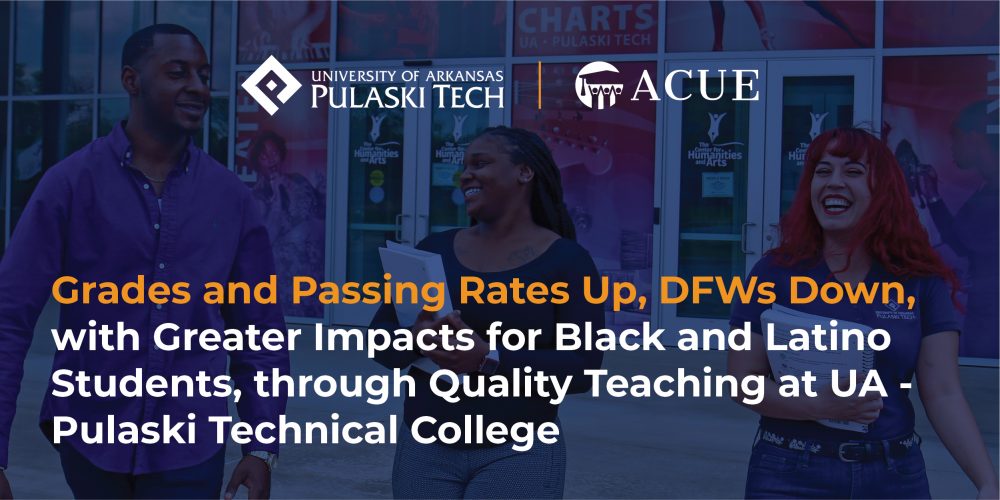
Stronger, More Equitable Achievement at UA – Pulaski Technical College through Quality Teaching
What kind of impact can a campus-wide investment in quality teaching have on student success?
Today, students at the University of Arkansas – Pulaski Technical College (UA-PTC), are significantly benefiting from the two-year technical college’s all-out focus on quality instruction, according to new research published by ACUE and UA-PTC.
Using rigorous methods to isolate the effects of better teaching, the research report consists of two separate analyses and examines course outcome data for more than 28,500 non-unique student enrollments from 2017 to 2019. The findings: students taught by ACUE faculty passed their courses, earned better marks, and received fewer DFW grades in significantly higher rates than students in course sections taught by non-credentialed faculty. They also show that UA-PTC students in ACUE faculty courses experience stronger equity, with an even greater impact for Black and Latino students.
Evaluating the efficacy of faculty development and its impact on student outcomes is a core part of how ACUE partners with colleges and universities nationwide. To date, ACUE researchers and institutional partners have published 21 reports on the results of their analyses. The UA-PTC findings further confirm numerous independently validated studies demonstrating better outcomes for students taught by ACUE Certified faculty.
“The data proves it works.”
To date, 98% of full-time UA-PTC faculty have earned the full ACUE Certificate, the only nationally-recognized college teaching credential endorsed by the American Council on Education (ACE).

Located in North Little Rock, Arkansas, UA-PTC plays a key role in the education and workforce training pipeline in Central Arkansas. One of Arkansas’s largest institutions of higher education, UA-PTC serves thousands of students who seek job-ready skills in the state’s in-demand professions: allied health, technical sciences, construction trades, advanced manufacturing, automotive technology, and many others.
For outgoing Chancellor Margaret Ellibee, who has led UA-PTC since 2012, the findings validate the institution’s strategic investments in student success.
“Like so many community colleges across the country, we’ve had to quickly transform ourselves to retain more students and keep them engaged,” said Ellibee, who will retire at the end of June after nearly four decades working in colleges and universities across the country. “As our top priority, quality teaching has been central to how we are breaking down barriers that stand in the way of student success for all our students — and the data proves it works.”
“Quality teaching is transformative.”
In UA-PTC’s strategic plan, high-quality professional learning and development for faculty and staff are top student success priorities. ACUE’s online, cohort-based credentialing program has been a key driver of this mission, providing impactful opportunities at scale.
Chancellor Ellibee has been a leading voice on student success strategies across the 22 community colleges in Arkansas. UA-PTC Provost Summer DeProw noted that having support at the very top of the institution has helped cultivate a culture of professional learning.
Through UA-PTC’s ACUE Fellows program, a growing chorus of ambassadors is taking up the torch to build on that momentum. On social media, UA-PTC shares special announcements for newly credentialed faculty, which are amplified by campus and faculty leaders. This year, ACUE Certified educators KiKi Heintz and Dr. Richard Moss helped launch the ACUE Focus newsletter, a weekly publication that highlights ACUE Certified faculty and their experiences with the program.
Scott Durand, ACUE’s CEO, underscored the connection between quality instruction and student success. The more faculty are equipped with evidence-based teaching practices, the more students “will be able to experience deep learning and engagement that can set them on a path for career success,” said Durand, who credited UA-PTC’s leadership. “Quality teaching is transformative, and we applaud UA-PTC’s leadership for making it the core of their student success agenda, leading to stronger and more equitable outcomes.”
“A clear return on investment”
Provost Summer DeProw said that ACUE is helping UA-PTC advance institutional strategies in a variety of ways:
- Corequisite course design for math and English as a Strong Start to Finish partner site
- Training faculty and leadership in evidence-based teaching and learning practices for English corequisite courses
- Securing workforce grant and funding opportunities
- Faculty and staff hiring and recruitment
In a culture that has long prioritized disciplinary or industry expertise, DeProw says that greater student success requires a greater focus on teaching craft.
“There’s a lot of talk around training faculty to become experts in their fields, but we never teach them how to teach,” said DeProw. “At UA-PTC, we’re changing that by investing in ACUE programs to reach every faculty member to the benefit of every single student. The data makes it clear: we’ve seen a clear return on investment for our students’ futures.”
‘Being an effective teacher’
Joe McAfee, who teaches electronics and other technical courses at UA-PTC, has nearly three decades of experience working in manufacturing and controls engineering. With another 20 years of technical instruction, McAfee wasn’t sure what he’d get out of ACUE.
“I had always thought of myself as an effective teacher before ACUE, but taking the course helped me realize just how much I didn’t know,” McAFee wrote in an ACUE Focus newsletter earlier this year. Among the changes he says he was able to immediately implement into his teaching were:
- Building more engaging syllabi
- Designing and implementing low-stakes quizzes to assess progress
- Using effective rubrics
- Teaching “just-in-time” math skills and concepts for review
“In the past, I’d taken several of the online courses that Pulaski Tech had offered for improving instructional skills, but ACUE was by far the most comprehensive and applicable of all,” said McAfee. “Although experience in industry can make one a subject matter expert, that is very different from being an effective teacher.”
To learn more about how to bring ACUE programs to your course or campus, please visit acue.org or contact our partnerships team at partnerships@acue.org.
What does your ACUE pin mean to you?
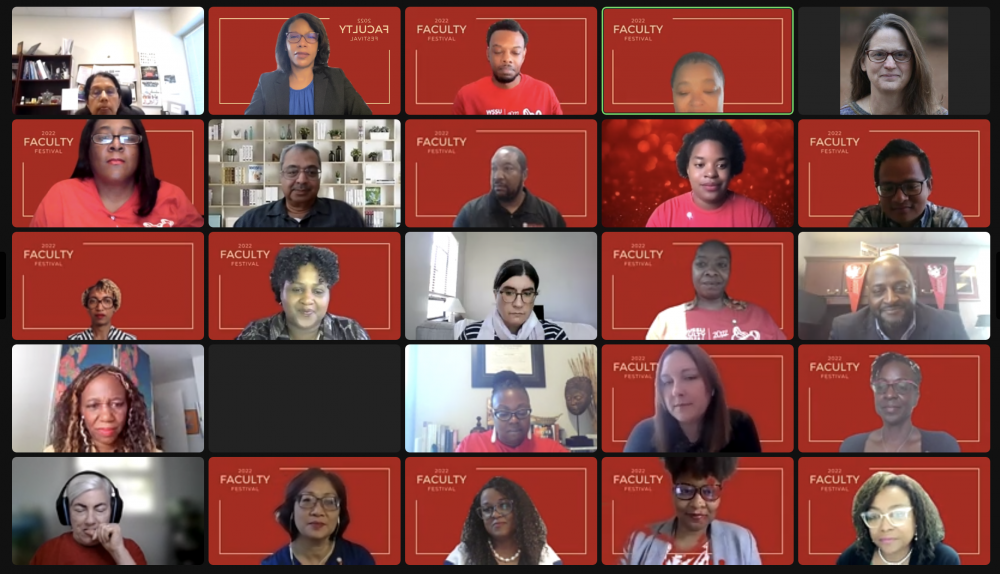
Winston-Salem State University Celebrates “Excellence in Online Instruction”
In this essay, Barbara Rodriguez, Ph.D. shares reflections on ACUE’s partnership with Winston-Salem State University, which is part of the “Excellence in Online Instruction” Initiative, supported by The Thurgood Marshall College Fund.
Who says you can’t feel energy and excitement in a Zoom room?

As part of Winston-Salem State University‘s annual Faculty Festival, more than 50 ACUE Certified faculty were recognized for earning their credential in effective college instruction. The partnership is part of the “Excellence in Online Instruction” Initiative, launched in 2021 with the Thurgood Marshall College Fund (TMCF) and ACUE to equip hundreds of faculty at Historically Black Colleges and Universities (HBCU) and Predominantly Black Institutions (PBI) with innovative, evidence-based practices.
Winston-Salem State University is a nationally-recognized institution and a top-ranked HBCU for advancing student social mobility. At the pinning ceremony, Provost Dr. Anthony Graham said the ACUE initiative for HBCU institutions offered an opportunity to serve its student-centered mission by enhancing institutional capacity. ACUE, he said, was “part of our ecosystem, where we focus on intellectual climate, student success, and lifelong learning.”
Having a clear vision for how ACUE would fit into Winston-Salem State’s institutional strategies is what has made our partnership so beautiful. We worked closely with the Center for Innovative and Transformative Instruction, which moved quickly and intentionally to recruit faculty for its inaugural cohorts.
The ACUE course, a comprehensive 25-module program, would require faculty to devote a significant amount of time on a weekly basis for the entire academic year. Once again, the Center for Innovative and Transformative Instruction, or CITI, was critical to supporting faculty and keeping them engaged throughout the entirety of the program. It was an honor to work with Dr. Wanda White, the center’s director, and Dr. Jeremiah Schipp, an ACUE co-facilitator who also created a Class of 2022 Yearbook that does an excellent job of telling the ACUE story at Winston-Salem State University.
“I really expected us to lose faculty over the course of the year, but you all challenged my deficit thinking,” Graham said. “We lost very few faculty throughout the year, which suggests to me that you are committed to our students, you are committed to your own learning opportunities, and you are committed to this university and what we stand for.”
“Faculty, thank you so very much for jumping in headfirst into this opportunity,” Graham continued. “You had faith in the size of a mustard seed, as they say, and you took that first step.”
To scale the ACUE Online Teaching Excellence program at WSSU, the CITI will work closely with certified faculty to serve as leaders for the university at large.
“We need you to be ambassadors within your departments and across the campus,” Graham said. “We must work in partnership to achieve the larger goal here, which is to ensure that student success and student engagement and learning at a very optimal level is occurring. That is the power of partnership.”
Dr. Barbara Rodriguez is the Regional Director for Academic Programs for ACUE.
Watch the full ACUE Pinning Ceremony on the Center for Innovative and Transformative Instruction YouTube page.
Hear from ACUE Certified Faculty at WSSU:
- Dr. Cindy Bell, Occupational Therapist (12:55)
- Dr. Fenghai Guo, Associate Professor, Chemistry (19:59)
- Ms. Michele Leverett, Instructor, University College
Celebrating the Next Generation of ACUE Certified Faculty
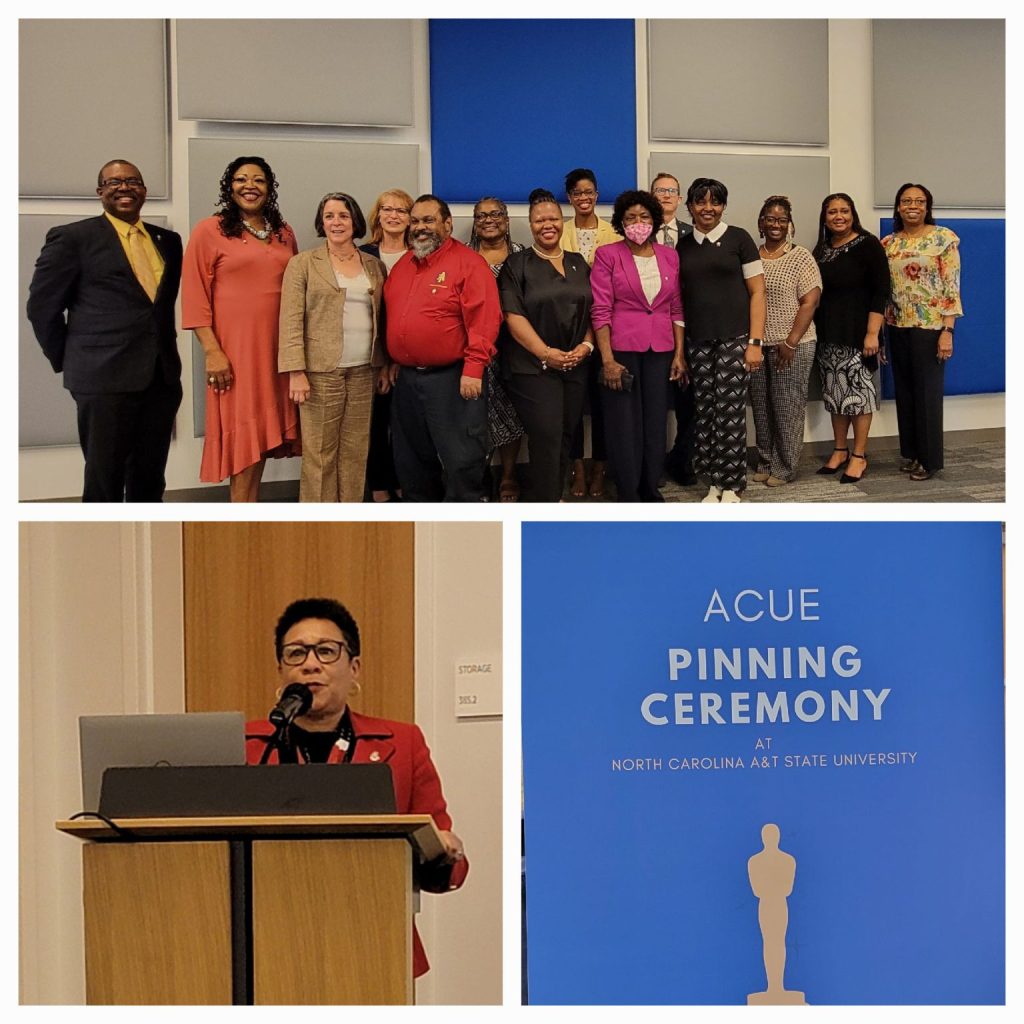
ACUE Pinning: ‘On cloud nine’ at North Carolina Agricultural and Technical State University
In this essay, Barbara Rodriguez, Ph.D. shares reflections on ACUE’s partnership with North Carolina A&T University and insights from attending this month’s ACUE Pinning Ceremony.

I’m still on cloud nine after attending North Carolina A&T University’s pinning ceremony to recognize and celebrate faculty who earned ACUE Certificates in Effective College Instruction. In addition to being a top-flight research university recognized for multidisciplinary excellence, North Carolina A&T is the largest historically black university (HBCU) in the country.
Pioneering educators at North Carolina A&T
The 23 faculty honored at the event were part of North Carolina A&T’s inaugural ACUE cohort. Our partnership began less than a year ago, but the success and enthusiasm of these pioneering educators have paved the way for many more faculty to have the opportunity to join ACUE.

Dr. Tonya Smith-Jackson, interim provost and vice chancellor of academic affairs, delivers opening remarks to ACUE faculty at North Carolina A&T.
Earlier this year, North Carolina A&T launched three more cohorts as part of a national study to expand higher education’s understanding of how Black, Latinx, Indigenous, and Pell-eligible students enrolled in gateway courses can benefit from evidence-based teaching. North Carolina A&T is one of 13 institutions participating in the study, supported by a $1.5 million grant from the Gates Foundation.
Putting students at the center
North Carolina A&T’s Center for Teaching Excellence, deserves a lot of credit for the success of this partnership. From day one, Dr. Audrey Dentith, the center’s director, and her team have shown a commitment to putting students at the center of teaching. With support from institutional leadership, including Dr. Tonya Smith-Jackson, interim provost and vice-chancellor of academic affairs, ACUE is helping to scale these efforts.
Under Dr. Dentith’s leadership, newly ACUE credentialed faculty will now take active roles in working to grow the community of educators to support one another in the future. Many of the ideas that these ACUE faculty will be implementing were inspired by their work in “What’s Next Reports” provided in the ACUE course.
Stories of impact
My favorite part about attending ACUE pinning ceremonies is hearing directly from educators about the changes and impact that came from their participation in ACUE.

The author snaps a selfie during a break in the pinning.
Dr. Marissa Dick, an ACUE Certified adjunct lecturer, shared one that showed how small tweaks to the way we ask students for feedback can lead to bigger changes.
In the module on Using Student Achievement and Feedback to Improve Your Teaching, one of the practices that Marrissa decided to implement was the Stop-Start-Continue exercise, which she used to collect anonymous feedback from her students about how the course is going. She noticed that multiple students asked her to stop writing the learning objectives on the board in cursive.
Marrissa was shocked. She had been writing in cursive for years, yet no student had brought it to her attention. When she asked her students why they hadn’t mentioned it earlier, they told her they didn’t feel comfortable saying anything. The Start-Stop-Continue exercise changed that.
The small fix was that Marrissa began typing up the learning objectives. To ensure the learning objectives remained a prominent presence during classes, she invited students to write them out on the board. She said students enjoyed writing on the board, and it resulted in several students “wanting a turn” to write on the board.
Marrissa’s story is one of the many reasons it has been a pleasure to support this partnership.
Dr. Barbara Rodriguez is the Regional Director for Academic Programs for ACUE.
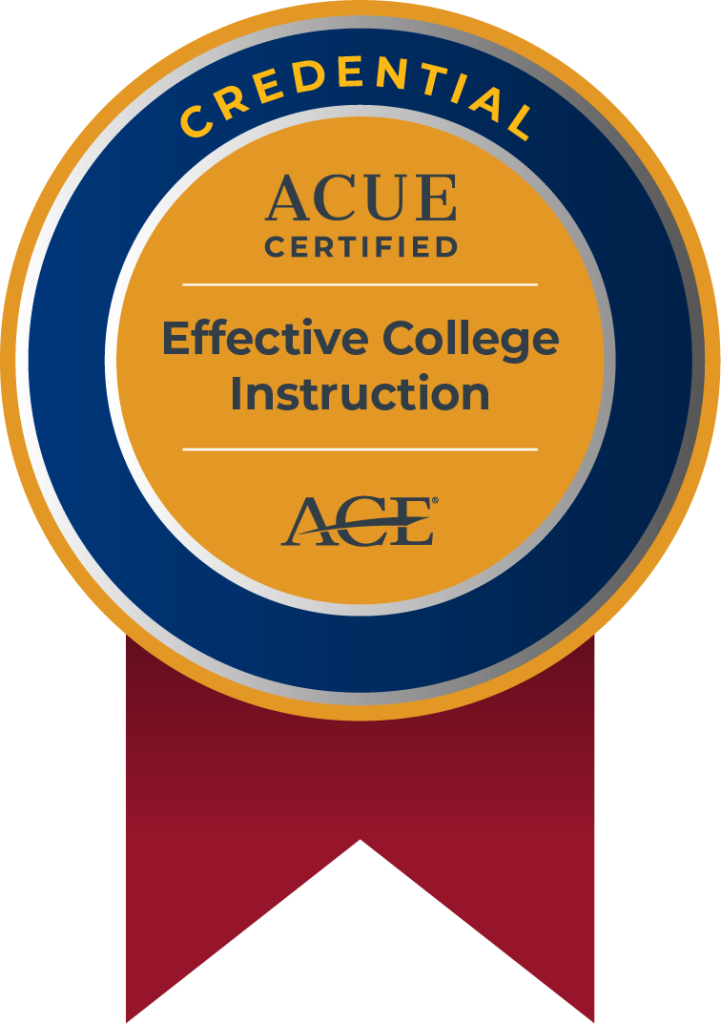
New Look, Same ‘Standard of Excellence’: What My ACUE Pin Means to Me
By Cindy Blackwell
I love my ACUE pin.
Now, I realize that using the word “love” for a pin may seem a bit overblown, but given all my ACUE pin connects me to, love is a completely appropriate term.
My ACUE pin is a connection to my commitment to teaching and student success. It represents the hard work I put into the ACUE Effective Teaching Practices course, which I completed during the 2016–2017 academic year. It is also a reminder of the relationships I developed with extraordinary colleagues at The University of Southern Mississippi who were in the course with me.
 A Symbol of My Academic and Professional Journey
A Symbol of My Academic and Professional Journey
Like diplomas and regalia, pins and pinning ceremonies have a long and distinguished history dating to the 12th century, when the Maltese Cross of Service was worn by hospitaller knights during the Crusades. This symbol eventually evolved into the nursing pin, which was first awarded to Florence Nightingale in 1856 by Prince Albert and Queen Victoria for Nightingale’s service during the Crimean War. For nurses, receiving their pin is a rite of passage signifying that the wearer is ready to enter the highly distinguished and most trusted profession.
The same is true for the ACUE pin. Those who earn the ACUE certification and pin have demonstrated the comprehensive knowledge and skills necessary to deliver instruction that improves student engagement, closes equity gaps, and increases student persistence.
“A Labor of Love”
To earn it, however, you have to do the work. As anyone who has been through the course knows, ACUE is a labor of love.
Its evidence-based learning design means all 25 modules guide faculty through high-quality and demanding learning experiences. Working from foundational knowledge through higher-order learning, faculty implement at least one proven teaching practice and critically reflect on it with feedback from expert reviewers. The quality and comprehensiveness of course content make it relevant to novice and advanced instructors alike. In addition, ACUE’s research-based Effective Practice Framework, organized around five core competencies, is built on a body of interrelated research that ties together all components of the course.
The Next Generation of ACUE-Certified Faculty
The ACUE pin is also like the nursing pin in that it has evolved — but only in design.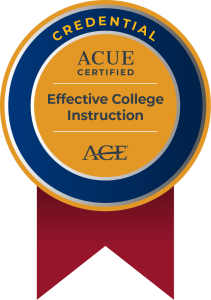
Recently, ACUE’s pins and certificate were updated to reflect ACUE’s new branding. They honor ACUE’s historic student success mission while representing the next generation of ACUE-certified faculty. While I am proud to wear the first-generation ACUE pin, which shows I was among the first pioneering faculty to earn this national distinction, I am even more excited for the next generation of faculty who will be working to make teaching a central part of student success in higher education.
What has not changed is the standard of excellence behind the ACUE pin, no matter which generation of ACUE pin you earn. I love my first-generation ACUE pin and look forward to connecting with and celebrating those who are earning the new ACUE pin, knowing they are keeping the ACUE movement moving forward.
Dr. Cindy Blackwell is an Academic Director at ACUE.
Faculty Are the Essence of the Institution
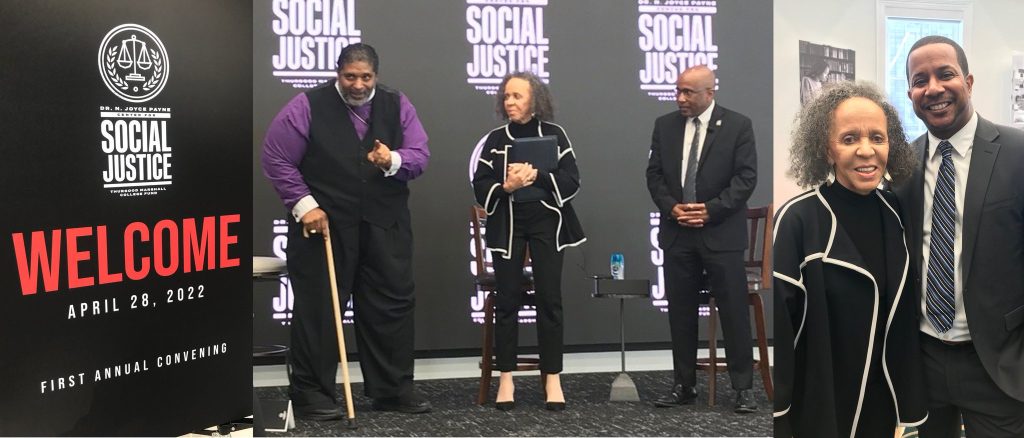
Reflecting on Higher Ed’s Role in America’s Fight for Equality and Racial Justice

Author Bacari K. Brown
Heading into last week’s inaugural convening of the Dr. N. Joyce Payne Center for Social Justice, I felt a mixture of emotions. Pride, optimism, inspiration, along with a little angst.
The ambitious agenda resembled our nation’s to-do list in the fight for equality and racial justice: health equity, educational justice, equal funding for HBCU’s, voting rights, and so much more. It felt overwhelming and, at the same the time, fitting for the leaders and organizations who gathered for the event.
The Thurgood Marshall College Fund (TMCF) created The Payne Center to serve as “a nexus in advancing social justice for Black Americans” – with HBCUs at the center. As a think tank and research center, its mission is to “identify, evaluate and scale new evidence-based programs and policies designed to create sustainable change to the fabric of Black life in American society.”
We were also there to honor Dr. N. Joyce Payne, who founded TMCF in 1987. Since its founding, TMFC has raised over $300 million to benefit the nation’s 47 publicly supported HBCUs and PBIs. Over 300,000 students per year are impacted directly by these efforts, including advancing equity through the “Excellence in Online Instruction” initiative launched in 2021. Through the initiative, TMCF and ACUE have equipped hundreds of faculty at HBCUs and PBIs with innovative, evidence-based practices – to the benefit of thousands of students.
In his remarks, Rev. William Barber II reminded us that our work is far from done. He made that soberingly clear, highlighting how we have gone backward in so many ways. For each milestone or landmark achievement, he said, there are systemic and institutional barriers that continue to sideline too many Black Americans.
Attending the event left me with a new sense of pride in ACUE’s mission to advance equity through quality instruction. For me, what resonated most from the Reverend’s remarks was his call to remain optimistic and proactive in the face of these challenges. Education can be transformational, and colleges and universities have a critical role to play in truly moving our country forward. But living up to the promise of higher education means providing all students with access to exceptional teaching and learning experiences. It will take work, but I am proud and hopeful to have thoughtful, committed higher ed leaders like TMCF leading the way.
Bacari K. Brown is a Partner Development Director at ACUE.


